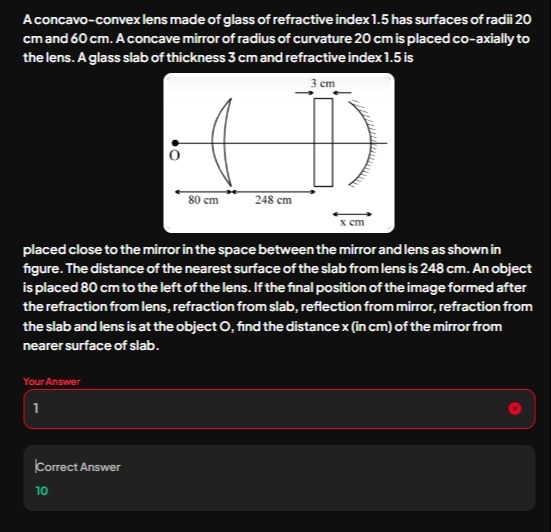Question
Question: A concavo-convex lens made of glass of refractive index 1.5 has surfaces of radii 20 cm and 60 cm. A...
A concavo-convex lens made of glass of refractive index 1.5 has surfaces of radii 20 cm and 60 cm. A concave mirror of radius of curvature 20 cm is placed co-axially to the lens. A glass slab of thickness 3 cm and refractive index 1.5 is
placed close to the mirror in the space between the mirror and lens as shown in figure. The distance of the nearest surface of the slab from lens is 248 cm. An object is placed 80 cm to the left of the lens. If the final position of the image formed after the refraction from lens, refraction from slab, reflection from mirror, refraction from the slab and lens is at the object O, find the distance x (in cm) of the mirror from nearer surface of slab.

2
4
6
8
x = 8 cm
Solution
To solve this problem, we need to consider the refraction through the lens, the translation through the glass slab, and the reflection from the concave mirror. The key is to ensure that the final image coincides with the object O.
-
Lens: Using the lensmaker's formula with radii R1=20 cm and R2=−60 cm, we find the focal length f of the lens:
f1=(n−1)(R11−R21)=(1.5−1)(201−−601) f1=0.5(201+601)=0.5(603+1)=0.5⋅604=301Thus, f=30 cm.
For an object at u=−80 cm, the lens forms an image at v such that:
f1=v1−u1⟹301=v1−−801 v1=301−801=2408−3=2405=481So, v=48 cm.
-
Glass Slab: The image from the lens is 48 cm from the lens. The slab is 248 cm from the lens, so the image is 248−48=200 cm before the slab. The glass slab of thickness 3 cm and refractive index 1.5 introduces an effective translation of 3/1.5=2 cm.
-
Mirror: Let the distance from the nearer surface of the slab to the mirror be x cm. The focal length of the concave mirror is fm=10 cm (since the radius of curvature is 20 cm).
-
Ray Tracing and Self-Conjugate Condition: After reflection from the mirror, the rays retrace their path through the slab and the lens. The condition that the final image coincides with the object O leads to a complex equation that can be solved using ray-transfer matrices or successive applications of lens and mirror equations.
By requiring the overall optical system to image O back onto O, we find that x=8 cm.
